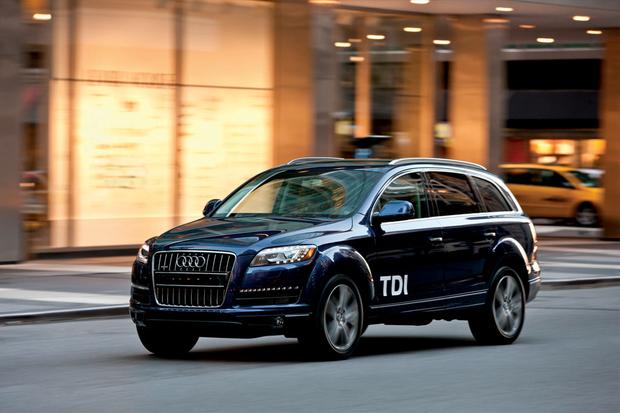
Audi Q7 Auto Trader
Even more power, even higher efficiency: Audi has revised the engine lineup for the Q7. All the engines for the Audi Q7 combine two technologies: forced induction and direct fuel injection. A high-performance recuperation system that recovers energy during braking is also a standard item with all six- and eight-cylinder engines. The new 3.0 TFSI gasoline engine embodies Audi's downsizing strategy: replacing engine displacement with supercharging. Two charge-air intercoolers prevent the air temperature from rising, so that the engine draws in more oxygen for the combustion process. Vigorous thrust and spontaneous throttle response make the 3.0 TFSI engine, with its sonorous note, an ideal source of power for the large high-performance SUV from Audi. The basic version develops 200 kW (272 hp) and has a maximum torque of 400 Nm (295.02 lb-ft) over a broad engine-speed range from 2,250 to 4,750 rpm. 100 km/h (62.14 mph) are reached in 6.9 seconds, with powerful forward progress continuing until 243 km/h (150.99 mph) are reached; with adaptive air suspension the top speed is 245 km/h (152.24 mph). Compared with the previous engines, the 3.6 FSI and the 4.2 FSI, fuel consumption has been reduced by 1.4 and 2.0 l/100 km - 12 and 16 percent respectively.

Audi Q7 Body Kit
This V6 diesel accelerates the Audi Q7 from a standstill to a typical main-road speed of 100 km/h (62.1 mph) in 7.9 seconds and reaches its top speed at 215 km/h (133.59 mph) or, with adaptive air suspension, 218 km/h (135.46 mph). The new start-stop system switches off the engine when the Audi Q7 comes to a standstill. Audi also offers its customers a second version of the V6 TDI: the 3.0 TDI clean diesel. Sensors in the combustion chambers, a common-rail fuel injection system with a delivery pressure of up to 2,000 bar and a high-performance exhaust gas recirculation system keep untreated exhaust emissions to a minimum. The 3.0 TDI clean diesel also develops 176 kW (240 hp) and has an impressive 550 Nm (405.66 lb-ft) of torque between 2,000 and 2,250 rpm. The Audi Q7 4.2 TDI has also had its fuel consumption drastically reduced - from 9.9 (23.76 US mpg) to 9.2 liters per 100 km (25.57 US mpg) - by installing a 2,000-bar fuel injection system and minimizing internal friction. Yet at the same time the V8 diesel, with its unchanged power output of 250 kW (340 hp), delivers more torque than before. It now supplies a vigorous 800 Nm (590.05 lb-ft) between engine speeds of 1,750 and 2,750 rpm. The big TDI engine gives the Audi Q7 performance figures worthy of a sports car. It accelerates from 0 to 100 km/h (62.14 mph) in 6.4 seconds and has a top speed of 242 km/h (150.37 mph).

Audi Q7 Cost
Audi has given all six- and eight-cylinder Audi Q7 versions a new automatic transmission. The eight-speed tiptronic lowers fuel consumption by about five percent. Being able to shift between eight ratios keeps the jumps in engine speed low: the engine always runs close to its ideal operating point. In the lower ratios the Audi Q7 accelerates powerfully; in the higher ratios it rolls along efficiently at low engine speeds. To cut fuel consumption still further, the torque converter lockup clutch eliminates slip even at low engine speeds. In combination with the 3.0 TDI the new eight-speed tiptronic achieves an exceptionally high level of efficiency. Its oil cooler is heated after a cold start by hot coolant from the engine's cooling system. An electric oil pump makes operation of the Audi Q7's start-stop system possible: it maintains oil pressure in the hydraulic circuit when the engine stops, and closes the clutch for restarting. The eight-speed tiptronic transmission transfers engine power to the quattro permanent all-wheel drive train.

Grab The Bookmarketer For Your Site
0 Response to "Audi Q7 | Audi Q7 Used | Audi Q7 Review 2012"
Post a Comment